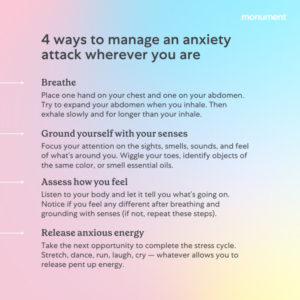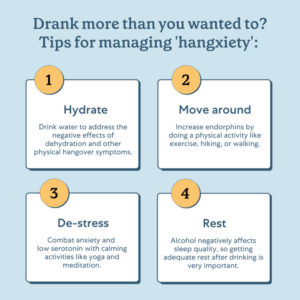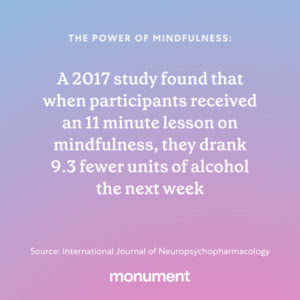Nearly 30% of adults experience an anxiety disorder at some point in their life, which makes anxiety one of the most common mental health conditions in the world.¹ Despite this fact, under 40% of people with an anxiety disorder receive treatment.² Given this lack of treatment, it’s not surprising that many people turn to alcohol to cope with anxiety. While alcohol can have short-term calming effects, it can ultimately exacerbate anxiety disorders and even cause anxiety in the long-term.
Let’s break down the relationship between alcohol and anxiety, and discuss how to find relief from anxiety without drinking.
Alcohol and Anxiety: What You Should Know
What Is Anxiety?
Generally, anxiety refers to an irrational sense of fear that manifests through muscle tension, obsessive thoughts, and avoidance of stressors. Everyone experiences anxiety from time to time, but when these incidents become more frequent and intense, they are classified as an anxiety disorder. There are various forms of anxiety disorders. These types include, but are not limited to:
- Social anxiety disorder
- Panic disorder
- Phobias
- Generalized anxiety disorder
- Separation anxiety disorder
Why Are Anxiety and Alcohol Use Often Connected?
Anxiety is one of the most common underlying factors that contribute to unhealthy drinking patterns. Anxiety symptoms include feeling tense, nervous, and uneasy, in addition to a variety of physical symptoms such as sweating and increased heart rate.¹ It’s only human to seek relief from discomfort, and given alcohol is a depressant, it can temporarily soothe some of these symptoms. However, once the initial effects of alcohol wear off, anxiety can spike again and with more intensity. Many people continue to drink in an effort to avoid this, creating an unhealthy cycle.

Does Alcohol Cause Anxiety?
Whether or not you suffer from an anxiety disorder, alcohol use can cause anxiety levels to rise. When you consume alcohol, dopamine is released in the brain. Dopamine is a ‘mood booster,’ which is why drinking can cause a pleasurable sensation in the short-term. However, when alcohol “wears off,” the brain’s serotonin, dopamine, and endorphin levels become depleted. This ‘come down,’ coupled with dehydration, can lead to anxiousness. The nervous system can also become overactive in reaction to the depressive effects of alcohol, causing an imbalance in brain chemistry. All of these factors can impact our mood and trigger anxiety. This phenomenon is often referred to as “hangxiety,” and can last from a few hours to a few days after consuming alcohol.
Does Drinking Alcohol Make Anxiety Worse?
While many people suffering from anxiety attempt to self-medicate with alcohol, drinking can make anxiety worse. Alcohol can temporarily numb uncomfortable feelings, but not only do those anxious feelings resurface, they often come back with even greater intensity. This is due to the chemical interactions of alcohol and the brain.
Moreover, alcohol can impair our decision-making and judgment, leading us to act in ways that don’t align with our values. When partaking in binge drinking or heavy drinking, many people also experience memory loss or blackouts. Reflecting on past drinking experiences can induce feelings of guilt and shame, and lead to even worse anxiety. In some cases, alcohol use can also contribute to social and vocational challenges such as relationship issues, job loss, financial issues, and more, leading to heightened anxiety and depression.
Fortunately, the cycle of using alcohol to cope with anxiety can be broken. Cutting back on drinking can help reduce alcohol-induced anxiety, and give you the space and clarity to address a pre-existing anxiety disorder with healthier coping strategies.
Risks of Using Alcohol for Anxiety
Drinking to soothe anxiety is a risk factor for developing alcohol use disorder. Alcohol use disorder is a medical condition characterized by drinking more than intended, and for longer than intended, despite wanting to cut back. Alcohol use disorder can negatively impact many dimensions of an individual’s wellbeing, including their mental health, physical health, and social life. Using alcohol to soothe anxiety can also increase your risk of developing various health conditions including:
- Insomnia
- Chronic headaches
- High blood pressure
- Depression
Both alcohol use disorder and anxiety disorder are treatable conditions, and require developing healthy coping mechanisms. Engaging in specialized alcohol therapy is an effective way to address these conditions simultaneously and find the relief you deserve.
Alcohol and Panic Attacks: What’s The Relationship?
There are several reasons why someone might experience an alcohol-induced panic attack, resulting in a sudden and overwhelming sensation of anxiety. Consuming unhealthy amounts of alcohol can deplete the brain’s dopamine, serotonin, and GABA levels to such an extent that it triggers a panic attack.³ Alternatively, if someone has an existing anxiety disorder, the spike of anxiety that occurs when alcohol is leaving the system can also cause an attack.
Panic attacks are also a symptom of alcohol withdrawal. When someone has developed alcohol dependence, cutting back significantly or quitting cold turkey can induce a panic attack. This is because with extended alcohol use the body can adapt to need alcohol for its basic functioning, and become overwhelmed when it’s removed. It’s important to speak with your healthcare provider to make a plan for cutting back on drinking safely.
If you believe you might be experiencing acute alcohol withdrawal, please contact your healthcare provider immediately and visit https://findtreatment.gov/ to find a location to get supervised detox near you. If this is a medical emergency, call 911.

How to Reduce Anxiety Without Alcohol
There are many ways to reduce the intensity and frequency of anxious thoughts, as well as cope with anxious feelings when they do arise. The same tools can also be used to manage alcohol cravings.
Address Underlying Symptoms
Dehydration, stress, hunger, and exhaustion are all factors that can trigger anxiety and alcohol cravings. Staying in-tune with your needs can help reduce anxiety levels as well as minimize the urge to drink.

Practice Mindfulness
Mindfulness means getting grounded in the present moment. This can help you interrupt anxious thought patterns, stay focused on what’s true, and have a clearer mind for taking action. There are many ways to incorporate more mindfulness into your day. For example:
- Practice stream-of-consciousness journaling
- Listen to a guided meditation
- Do a deep-breathing exercise
- If relevant to your goals, practice mindful drinking
- Bring mindfulness and intention into everyday tasks

Talk With a Therapist
One of the most effective ways to treat anxiety is to work with a therapist. In therapy, you can evaluate the root cause of your anxiety and develop healthy coping strategies. Many people are unaware that cognitive behavioral therapy is also proven to help reduce alcohol consumption, and that many of the same tools can address anxiety disorders and alcohol use disorder simultaneously.
At Monument, our therapists are specialized in treating substance use disorders while addressing co-occuring conditions, like anxiety and depression. In online alcohol therapy, you can create a personalized treatment plan tailored to your needs and goals.
Explore Medication Options
While medication isn’t a part of everyone’s journey, it can be incredibly helpful for some. Generalized anxiety disorder and alcohol use disorder are medical conditions with FDA-approved medication options. At Monument, physicians can prescribe naltrexone or antabuse to support your sobriety if safe and appropriate for you. You can learn more about naltrexone vs antabuse, and connect with a physician to discuss your specific needs. You can also speak with your primary care physician about anti-anxiety medications to see if they are safe and appropriate for you.
Anxiety can be incredibly challenging to navigate. Unfortunately, alcohol can provide a false sense of relief. Learning more about how alcohol use can worsen anxiety can help you better understand your own symptoms and consider alternative ways to cope. Alcohol use disorder and anxiety disorder are treatable conditions, and you don’t have to navigate them alone. Connect with a Care Team at Monument to begin a treatment plan tailored to you.
Sources:
- Psychiatry.org. “What Are Anxiety Disorders?, https://www.psychiatry.org/patients-families/anxiety-disorders/what-are-anxiety-disorders#:~:text=Anxiety%20disorders%20differ%20from%20normal,some%20point%20in%20their%20lives.” Accessed Apr, 20. 2022.
- ADAA. “Facts & Statistics: Anxiety and Depression, https://adaa.org/understanding-anxiety/facts-statistics.” Accessed Apr, 20. 2022.
- J Clin Psychiatry. “Alcohol use disorders and panic disorder: a review of the evidence of a direct relationship, https://pubmed.ncbi.nlm.nih.gov/17592911/.” Accessed Apr, 20. 2022.
- Alcohol research: current reviews vol. 34,4 (2012): 414-31. “Anxiety and alcohol use disorders: comorbidity and treatment considerations, https://pubmed.ncbi.nlm.nih.gov/23584108/.” Accessed Apr, 20. 2022.
Naltrexone has the capacity to cause hepatocellular injury (liver injury) when given in excessive doses. Naltrexone is contraindicated in acute hepatitis or liver failure, and its use for a patient with active liver disease must be carefully considered in light of its hepatotoxic effects. In the treatment of alcohol dependence, adverse reactions include difficulty sleeping, anxiety, nervousness, abdominal pain/cramps, nausea and/or vomiting, low energy, joint and muscle pain, headache, dizziness, and somnolence. This is not a complete list of potential adverse events associated with naltrexone hydrochloride. Please see Full Prescribing Information for a complete list.
The most common side effects of Disulfiram may include drowsiness, tiredness, headache, acne, and metallic-like taste in the mouth. Call your doctor if you have signs of serious side effects such as decreased sexual ability, vision changes, numbness of arms or legs, muscle weakness, mood changes, seizures, or confusion. Do not take Disulfiram if you are allergic to any of the ingredients. If you begin to have signs of an allergic reaction, then seek immediate medical attention. Avoid consumption of alcohol while taking this medication, as it may lead to adverse side effects. Talk to your doctor about the history of your medical conditions including if you have or have had diabetes, underactive thyroid, brain disorders, liver or kidney disease, personal or family history of regular use/abuse of drugs. Certain drug interactions may lead to serious adverse side effects. Let your doctor know about any other medications you are taking. This is not a complete list of potential adverse events associated with Disulfiram. Please see Full Prescribing Information for a complete list.*Monument Inc. provides administrative and business support services to independent medical and clinical practices and providers. Monument Inc. does not provide medical or clinical services and does not own medical or other clinical practices. All medical services are provided by Live Life Now Health Group, PA d/b/a Live Life Now Medical Group. All counseling and therapy services are provided by independent licensed practitioners including licensed clinical social workers (LCSW) and licensed mental health counselors (LMHC). Individuals should contact their physician or therapist with any questions about their treatment.